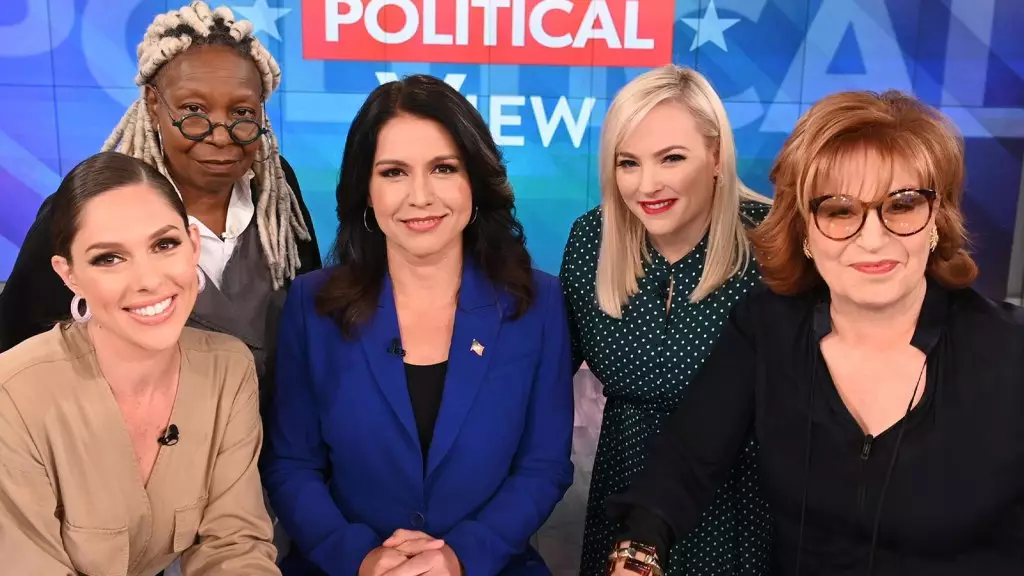Meghan McCain, a figure often in the spotlight since her emergence on political talk shows, recently shed light on her evolving friendships and her turbulent tenure on “The View.” Her deepening bond with former Democratic presidential candidate Tulsi Gabbard was on display during the Stand with Women event in Philadelphia—a moment that ignited memories of their time on the ABC talk show. McCain took full advantage of the platform, casting critical remarks at her former co-hosts, which paints a compelling picture of her departure from the show and ongoing grievances.
McCain’s relationship with Gabbard initially blossomed during her appearance on “The View.” At the event, they both reminisced about their time on stage, with Gabbard recalling the noticeably tense atmosphere during her appearance. McCain recounted feeling compelled to defend Gabbard against what she described as a hostile panel. “They were so scared of her,” McCain remarked—a sentiment that may reflect not just her perspective on Gabbard but also her broader views on the dynamics of the show. The verbal picture she painted, describing her co-hosts as “vultures,” reveals the deep-seated animosity that characterized her experience, which is further amplified by her insistence on recollecting the specific moment when Behar challenged Gabbard fiercely.
This environment of conflict, punctuated by personal alliances, underscores the complexities of navigating political discourse in a high-stakes media setting. McCain’s acknowledgment of neediness for Gabbard during their discussion at the event signals the difficulty in forging authentic connections when one’s professional life is intertwined with combative interactions. This duality between friendship and public persona highlights the struggles many face in the entertainment industry—especially when politics is thrown into the mix.
Post-Show Reflections and Legal Threats
After departing from “The View” in 2021, McCain has not shied away from communicating her disdain for the program. Recently, she indicated that the animosity from her former co-hosts continues to impact her life, as seen during a discussion where fellow host Ana Navarro alluded to McCain in the context of nepotism. Feeling a sense of attack, McCain hinted at potential legal action and maintained a steady presence on social media to air her grievances, asserting that “these women will never quit me.”
This continual engagement, albeit fraught with tension, signifies how McCain is possibly leveraging her experiences for personal branding. Her decision to engage publicly with her experiences instead of remaining silent showcases a strategic choice to maintain relevance, even at the cost of public feuds. It raises questions about the nature of conflict in media and whether such disputes are merely performance art.
McCain has asserted her disinterest in returning to “The View” in any capacity, proclaiming there is “not a chance in hell” she would accept an offer to rejoin the panel—even as a guest. This bold proclamation can be interpreted as both a protective gesture to shield her own identity from the show’s inherent drama and a strategic maneuver to cement her narrative that paints her step back from the series as a liberation from a toxic environment.
While McCain does maintain connections with some staff who have been loyal to her, she revealed that there is no existing friendship with her former co-hosts. “I don’t talk to any of the main co-hosts,” she confirmed, revealing a sense of alienation that belies the public persona cultivated during her time on television. Her hesitance to disclose the identities of her remaining friends from the show further underscores her acknowledgment of the bullying culture she subsequently distanced herself from—an experience shared by many in high-pressure professions.
In the aftermath of her departure from “The View,” McCain’s narrative remains one of defiance and remembrance intertwined with occasional bitterness. Her close friendship with Gabbard serves as a juxtaposition to the perceived hostility of her former colleagues, indicating that while she has left behind the tumultuous waters of daytime talk shows, the ripple effects of her experiences continue to shape her public identity. As McCain navigates this sensitive phase, her insights offer a poignant look at the challenges of balancing personal beliefs with public life, epitomizing the broader struggles many face within the media landscape today.

